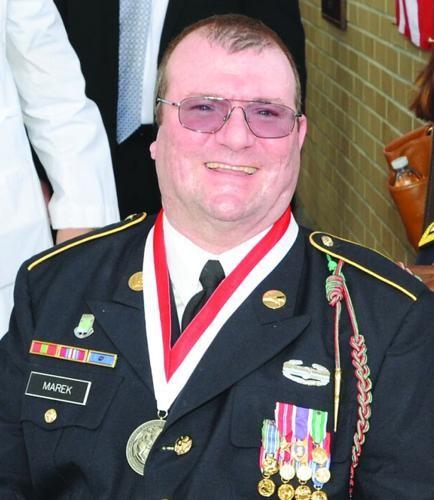Russ Marek went through hell and survived. Now he’s hoping to inspire other veterans facing their own struggles.
Marek, a U.S. Army veteran from Melbourne, Florida, was badly wounded after being hit by an Improvised Explosive Device (IED) while serving in Iraq. He spent 13 weeks in a coma at Walter Reed National Military Medical Center in Washington, D.C., trying to recover.
Marek told doctors the only thing he could recall from that fateful day more than 20 years ago was seeing a flash of light. Then he was out.
When he finally regained consciousness, Marek wondered what had happened to his right arm and right leg. The blast had torn them off. His doctors said it was a “blessing you don’t remember” what happened.
The IED also caused burns on nearly a quarter of his body. If that wasn’t enough, Marek also had a serious brain injury. He had to relearn simple tasks like talking and swallowing.
Blast That Changed His Life
While he still can’t recall many details, Marek will always remember Sept. 16, 2005.
Only eight days from rotating out of Iraq, Marek was excited to return home. But he had one more assignment left.
Having just been promoted to staff sergeant two weeks before, Marek’s final mission was to cut off an enemy convoy with 150 trucks arriving from Iran. The Army believed the trucks were being used to deliver arms and ammunition to insurgents.
Marek’s unit traveled in a three-tank formation. The sergeant’s tank was the last one coming through. All three had rolled across a culvert covering up a huge IED – 1,000 pounds of explosives encased around one 155 mm artillery round. When Marek’s tank hit the device, it detonated, blasting through the bottom of the vehicle.
The devastating hit killed three soldiers in Marek’s unit. It’s believed Marek would have been the fourth to die if not for the rapid response of an Army medical team, saving his life.
Twenty years have passed since that horrible day. For Marek’s father, Paul, the memories remain burned into his mind.

“I’ll never forget the doctors at Walter Reed telling me that Russ may never walk or talk again,” Paul Marek said.
Despite a long, grueling road to recovery, Marek is talking and walking again. He’s using his voice to share his traumatic experience with other veterans. Many of them have also endured mental and physical obstacles.
Coming out of his coma after more than three months, Marek was simply glad to be alive. He then worked hard on his rehabilitation. He’s hoping to pass along his message of resilience to help other veterans.
“The brain injury shut down all functions on the left side of my body,” Marek said. “I had to learn to speak and swallow.”
Long Road to Recovery
Marek spent long days in physical therapy and speech therapy, sometimes going seven days a week. These days, Marek can articulate his thoughts, but it might just take a while longer than before the injury. He walks with help from a cane. Marek is still getting accustomed to his new limbs after surgeries for leg and arm transplants.
“I believe God saved me in order to advance the science of limb transplants,” Marek said.
Inspiring Other Veterans
Marek travels to VA hospitals around the Florida region to talk to veterans. One wouldn’t blame Marek for feeling a little sorry for himself after all he’s been through.
That’s simply not who Marek is. “I decided I was going to help others,” he said.
Marek’s father joins him on his VA visits to help out. During one recent visit, staff told him afterward that three veterans who had shown signs of suicidal ideation came away from listening to Marek inspired to keep fighting.
After all, if Marek could keep enjoying life, what was holding them back?
“My message to all veterans is to keep smiling. There is nothing you can do to change what happened. Don’t dwell on the past,” Marek said.
While he’s made tremendous strides, the Army veteran still needs around-the-clock care. Marek works out three times every week with a fitness coach to help build strength and gain more independence.
He also works to raise funds for veteran programs. But he refuses to take payment for his inspirational meetings with veterans.
“If sharing my story with other veterans and their families helps them with their healing and inspires them to keep going, then I’m continuing to fulfill the mission I was sent here to do,” Marek said.















